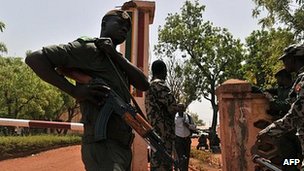Mali's neighbours are considering imposing an economic blockade to force its military leaders to step down, after rebels seized the whole of the north over the weekend.
West African leaders had given Mali's junta until Monday to leave power or face sanctions.
The army said it had staged its coup because the campaign against the Tuareg rebels had been poorly run.
But the Tuareg fighters have responded by making rapid advances.
After seizing the historic city of Timbuktu on Sunday, rebel spokesman Moussa Ag Assarid told the BBC that his forces had no intention of moving south, towards the capital, Bamako, but would consolidate their control of the areas they had seized.
His National Movement for the Liberation of Azawad (MNLA) group wants independence for the Tuareg's northern homeland, which it calls Azawad. Other rebel forces in the north have recently joined forces with Islamist militants in the region.
Former colonial power France has said it will not intervene in the conflict, the AFP news agency reports.
It has advised its nationals "whose presence is not essential" to leave the country – including those in Bamako.
There are around 5,000 French nationals in Mali, AFP says.
Belgium and the UK have issued similar advice.
The coup and rebellion have exacerbated a humanitarian crisis in Mali and some neighbouring countries, with aid agencies warning that 13 million people need food aid.
'Build a nation'
Sometimes called the Blue People because the indigo used in some traditional robes and turbans dye their skins dark blue
Historically nomadic Berber people who live in the Sahara and Sahel regions of Libya, Algeria, Niger, Burkina Faso and Mali, which they call Azawad
When camels were introduced into the Sahara 2,000 years ago, the Tuareg became the main operators of the trans-Saharan caravan trade in commodities such as salt and gold
Lost out when trade switched to the Atlantic Ocean
The Tuareg in Mali say they face discrimination because they are light-skinned and have been neglected by the government in far-off Bamako
They prefer to call themselves themselves the Kel Tamasheq or speakers of Tamasheq – their language which has its own alphabet
Mali crisis: Who's who?
Coup leader Capt Amadou Sanogo has asked for international help to fight the rebels, whose ranks have also been swelled by well-armed fighters returning from the conflict in Libya, where they backed former leader Muammar Gaddafi.
He has said he will restore the previous constitution, but said the army was not leaving power.
Analysts say the poor, landlocked country would be unable to survive for long if its neighbours severed economic links.
Regional group Ecowas had threatened to close borders, freeze assets and withhold credit after troops ousted the government in a coup 10 days ago.
Mali shares its currency with seven other countries – and other members of the CFA franc zone have said they will cut transfers to Mali's banks.
Ivory Coast President Alassane Ouattara, who heads Ecowas, said he had spoken to Capt Sanogo to thank him for his pledge to restore constitutional order.
But Mr Ouattara did not say if the sanctions threat remained.
"We will work [with other leaders] as soon as possible… so that this [return to constitutional rule] will be done," Mr Ouattara said on Senegalese state television.
Mr Ouattara said earlier that the bloc was prepared "to take the necessary measures".
Capt Sanogo said he would consult local political forces to set up a transition body "with the aim of organising peaceful, free, open and democratic elections in which we will not take part".
He also told AFP news agency he had dispatched envoys to the Timbuktu region to try to obtain a ceasefire with the rebels.
His dramatic U-turn came after regional leaders put huge pressure on the junta.
Ecowas leaders are meeting in the Senegalese capital, Dakar, to discuss Mali on the sidelines of the swearing-in of Senegal's new President, Macky Sall.
Mr Assarid told the BBC's Network Africa programme the rebels were ready to discuss a ceasefire with Mali's army.
"We want to build a nation for our people in Azawad," he said. "Not Bamako – Bamako is the capital of Mali."
The rebel seizure of Timbuktu is their third major capture in three days after the north's other main towns of Kidal and Gao.
Witnesses in Timbuktu said rebel fighters had taken the airport, administrative buildings and military camps.
"The city is totally under their control," Timbuktu's Mayor Ousmane Halle told AP news agency by phone.
Residents told the BBC there had been no fighting in the town.
"Early in the morning, there were some noises, and people were scared. And then later on, there's no fighting on the streets, nothing happened; they just fired in the air and finished," said one resident contacted by telephone.
Witnesses said rebel fighters were mixing with local Arab militiamen, who have been protecting businesses since troops fled the town.
MNLA rebels are said to have been driving around the town in pick-up trucks, waving their flag.
A statement released by the MNLA said they would now begin their "mission of defending and securing the territory of the Azawad, for the happiness of its people".
Ousted President Amadou Toumani Toure is believed to still be in Mali – he has said he is free and in good health.
BBC



